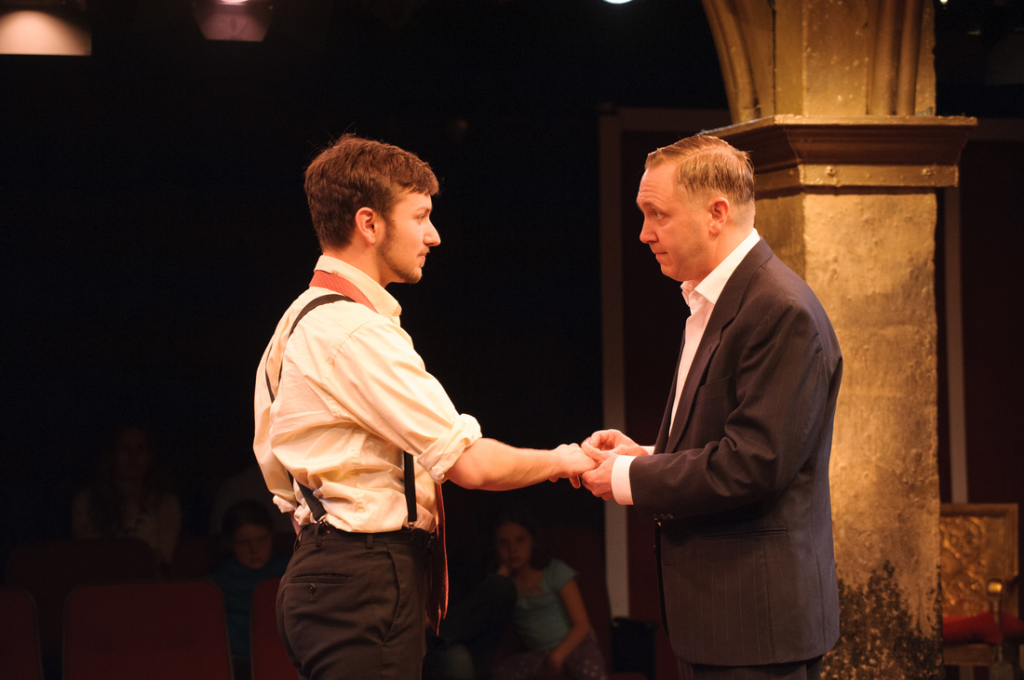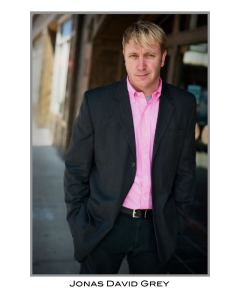“But whate’er I be, nor I, nor any man that but man is, with nothing shall be pleased till he be eased with being nothing.” A profoundly Zen quote to come from the tongue of Shakespeare. Uttered by the title character of Richard II, which is now playing at Chesapeake Shakespeare Company under the direction of Kevin J. Costa, the quote brings to mind a different way of viewing life and of viewing Shakespeare’s tragic histories. In a TheatreBloom exclusive interview, resident acting company member Jonas David Grey takes a few moments to explain what it’s like to live as Richard II. The hidden bonus comes from his experience of playing Edward II just a few months prior at another Baltimore area theatre.
If you could start off by informing the readers of TheatreBloom who you are, what you’re doing currently, and where you’ve been recently, that would be great.
Jonas David Grey: My name is Jonas David Grey and I’m currently playing Richard II at Chesapeake Shakespeare Company. Prior to that I played Edward II at Spotlighters Theatre. Prior to that I did a show called Smellin’ up the Den as a part of the Capital Fringe Festival through Red Knight Productions and we’re reprising that in Alexandria, Virginia in January. I’m a resident actor with Chesapeake Shakespeare Company so a lot of the work I have done recently has been with them.
You’re playing the title character of Richard II, what was the appeal to want to get involved with that particular Shakespearean history/tragedy?
Jonas: That particular show? My very first experience with Shakespeare was in 11th grade with Richard II. We had a very ambitious English teacher who showed us the Derek Jacobi version and I was struck by the language, the imagery especially the religious imagery. It was my only A+ paper in that class on the religious imagery in Richard II and it really stuck with me. It was my first Shakespeare. I’ve always loved the character; I love the role. It’s not a show that people do often. It is entirely in verse, which is rare for Shakespeare, but it’s also a prototype in a way. You can find shades of Hamlet and shades of King Lear in this show. I’m glad it’s not done a lot because that means we’re doing something different.
But the appeal was the character. He’s fascinating. He’s flawed. He’s the last successive Plantagenet king. There are family lines— kings in England were linear they typically came father to son, father to son, and father to daughter a little bit later on— people may have heard of “The War of the Roses” or the “Great English Civil War” that began with Richard’s downfall. There are huge questions of the divine right of kings and how legitimate it is to have a ruler who is a ruler simply because his father was a ruler regardless of how good or bad he is.
I’ve seen productions of Richard— and I mentioned Edward II which I know we’ll probably talk about later— there are similarities and there are differences. And my experience with Edward and with Richard has been I have never been particularly satisfied with the productions or portrayals that I’ve seen of those characters. The Richard that CSC is presenting is very different than the recent ones that have come out. David Tennant did it for the Royal Shakespeare Company, Ben Whishaw did it for the BBC, and they both played a very different Richard. He’s often portrayed as very slight and very effeminate, very sort of flippant and vacuous. I don’t think that’s a bad decision for a director or an actor to make, necessarily, but it’s not how I saw the character at all.
Richard II was decided upon as a part of the CSC season but how did you end up being involved with it?
Jonas: As a resident actor I was just cast. That’s part of what the company does. They are very much a company. It’s great getting to have that sort of opportunity. Right now I’m doing this and then I’m playing Friar Laurence in Romeo and Juliet in the spring. I’ve played Mr. Benett (Pride and Prejudice) for them and I’ve played the Prince in Romeo and Juliet. I did Catesby in Richard III, which is a minor, minor character. I studied spiders and snakes to get a character together for Catesby. But it’s nice to have those opportunities to take a much smaller role and infuse it with some sort of truth and find out how it supports the production. And then to turn around and be able to do something this big; that’s one of the great things about working with a company like CSC is that you get all of those opportunities.
You briefly mentioned Edward II there, which we are going to get to, but for those of us not in the Shakespearean/historical know, are the two characters related?
Jonas: They are historically related. Richard was Edward’s great-grandson. So at the end of our production of Edward II, Edward III takes the throne, and that was Richard’s grandfather. So now I’m playing my own great-grandson. Jack Connors, the young actor who played my son in that production three months ago, would now be my grandfather.
You played Edward in that production of Edward II at Spotlighters Theatre earlier this season, how did that come about?
Jonas: Edward II has been— had been, it’s done now— in my head for about 20 years. I saw Derek Jarman’s film and was struck by the themes of homophobia, homosexuality, people opposing somebody just because of who they loved. But I felt like it was over politicized and that there was a love story there that wasn’t being told. So I read it and then I became obsessed with it. I watched the Royal Shakespeare production of it from the late 60’s with Ian McKellen and I hated that production. I was dissatisfied with both productions that I had seen but I loved the script. So I started digging into Marlowe’s script and over the course of that many years I began to envision a different type of Edward.
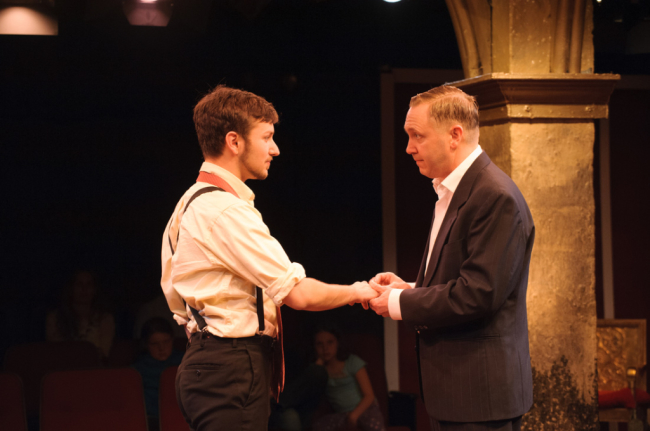
About three years ago it came up again, to be honest I don’t even remember how, but I pulled the script out again and started editing it and cutting it in earnest and went through about 15 revisions before I got to the version that we produced. I wanted to tell the love story. I wanted it to be a love story. I wanted it to be a story about the inequity of prejudice and what it does to relationships and how it can destroy people. And I wanted it to be fast. When I went to the directors of that show about doing this I said “it’s got to clip. It’s got to move.”
And then we had the issue that there are only two female characters in Marlowe’s Edward II and I cut one of them. So we started talking about how we could remedy that and that’s one of the main reasons, from a practical standpoint, that we moved the show to the 1930’s. We moved it to that specific time not only so that we could include more women but from a political vantage point things that were happening in London in 1936 were extremely similar to things that were happening in Edward’s time. We were able to bring these women into it and give them these roles and I couldn’t be more pleased with the way that all turned out.
You have one production— Edward II— that was adapted away to another place in time and then you have this production— Richard II— which is very true to the time in which the play originally takes place, what was it like doing one piece true to period and the other as an adaptation?
Jonas: They’re very different because Edward II was mine. I adapted it. I produced it and I had a very heavy hand in the way it was played. I have the luxury in Richard II of just being Richard. I have no input with costuming, timing, casting, or anything else. That’s very liberating in a different way to be able to just step in and really try to dig into this character.
It’s funny because playing a period piece is no different than playing any other piece because it’s all about the characters. It’s all about what’s being said and who is saying it. Once you’ve got a handle on the language, on the verse and being able to work within the context of the meter there’s no other job than to be truthful in your performance and to build on the relationships in the show. We’re dressed differently but you could put us in any costumes and see the exact same performances.
Edward and Richard are very different. What was it like getting to play both in one season, not many actors can say they’ve done both in their career let alone within months of each other.
Jonas: It’s an extremely humbling experience. These are two roles that I’ve wanted to play for a very, very long time and to be able to play them both in one season is just mind-numbing. It’s been great and the fact that there is a relationship, a connection between the show, has been incredible. Edward, from a practical standpoint, I had lived with the script for so long that by the time we started rehearsal I knew it. I knew everybody’s lines by that point. With Richard it was all brand new so learning the verse was a big deal. Richard talks a lot. I think Edward’s longest speech in my edit was maybe half a page uninterrupted. Richard’s is three pages uninterrupted. That was the challenge from a practical standpoint.
As far as developing the characters, finding the motivation for Richard was a challenge because Shakespeare just starts. I think one of the criticisms that people have thrown out there about Richard II at least that I’ve heard is that the show just begins. The first line is “Old John of Gaunt have you done this thing?” You know? And people are like, “Wait, who’s John of Gaunt? What are they talking about?” Edward seems very cruel and very arbitrary in making these guys fight and then banishing them for no reason, so I had to dig into the history there—
Amanda: Richard? You said Edward…
Jonas: Richard’s history. Yes Richard. Richard. Richard. Richard. Sorry. I cannot tell you how many times I’ve done that! But only when I talk about them, I don’t get them confused on stage. Moving onto Edward for real this time. Finding a motivation for Edward was easy, Edward was simply moved by passion. He was in love with somebody and everybody said “you can’t be.” Finding a motivation for Richard was different. He came to the throne when he was nine years old and he had all of these uncles ruling on his behalf until he was a certain age.
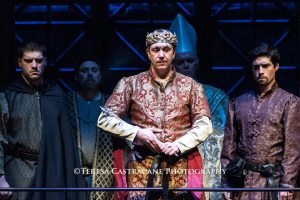
What people don’t see in Richard II but there are allusions to is that about ten years prior to where this play starts several of the nobles opposed Richard. So they executed his tutor and several of his closest friends and exiled a bunch of others and humiliated him in attempt to take power from him. There were five in particular who set themselves up as what they called the Lords Appellant. Richard bided his time and at the time that Shakespeare’s play begins he had successfully disposed of three of them. There were only two left and the two left where Henry Bolingbroke and Thomas Mowbray.
So for me there’s very much a Godfather momentum going into this. This is all about revenge at the beginning. But then it becomes about why does he fall? If he has the power why does this happen? It was fun to sort of delve into those relationships and figure Richard out. Richard is ruled by his intellect and by his ideology. He very much believes that he is rightful in all that he does because he’s the sovereign. He doesn’t really know himself until the end. Our Director’s (Kevin J. Costa) program note is brilliant on tragedy. Richard doesn’t really find himself suited to live in the world until the world no longer wants him and that’s the tragedy of this. Edward’s tragedy is more personal; he loved and lost and that destroyed him.
What are the defining moments in these shows for both Edward and Richard, and how are they similar or different to one another and what do they mean to you as an actor?
Jonas: The defining moment for me in Edward? There were two. The news of Gaveston’s and that breakdown for him that was when his world changed forever. That’s when— I don’t think he ever lost the will to live— but that was the beginning of the end for Edward. Then the very last scene that we had, Edward’s murder, it was very surreal. It’s interesting to compare to Richard’s demise because Edward’s death was almost this hallucinogenic strange sort of reckoning of all that had come before. Whereas with Richard he’s lost his place in the world but he’s finally able to have this conciliatory moment with the heavens in which he is at peace with going back from whence he thinks he came.
The defining moments on stage for Richard are probably my first scene in act II— the deposition scene. Again, Kevin Costa our Director gets so much credit for what I and we are doing. He’s amazing. Richard, even though he’s losing his crown, never loses power in that scene. He gives it away. No one takes his crown from him. His personal strength at that moment, I think that’s his turning point. He recognizes that circumstance has brought him to this but he’s not going to submit in a weak fashion. He takes the crown back and he gives it— he says it, “with my own hands I give away my crown.” I believe that’s when he starts to become human.
Towards the end when he’s in prison there is this gorgeous speech. One of my favorite lines in all of Shakespeare is right there in Richard II. “But whate’er I be, nor I, nor any man that but man is, with nothing shall be pleased till he be eased with being nothing.” Just that idea that once I’m empty of everything I can be content. That’s where he ends. Richard ends well. I think Richard’s soul is at peace as he ends. He goes out fighting. That’s the thing, he doesn’t resign. Edward resigns. Edward doesn’t fight. He’s done, he’s defeated, the world has beat him. I don’t believe that the world ever beat Shakespeare’s Richard.
Getting to undertake both of these tremendous roles in one season, what has that taught you about yourself as a performer?
Jonas: Lesson One: Eat before a performance. The literal learning lesson. There was a moment on stage the other night when everything just went dark. My blood sugar just dropped. It’s easy to forget the physical demands of something like this. It’s all about breathing, it’s all about pushing, it’s all about moving. It’s not like working out at the gym but it does exact a lot of the same type of— the similar— it takes— it takes the same type of tolls. Clearly it makes me be able to not talk words. If we were doing this interview in verse it might be easier right now.
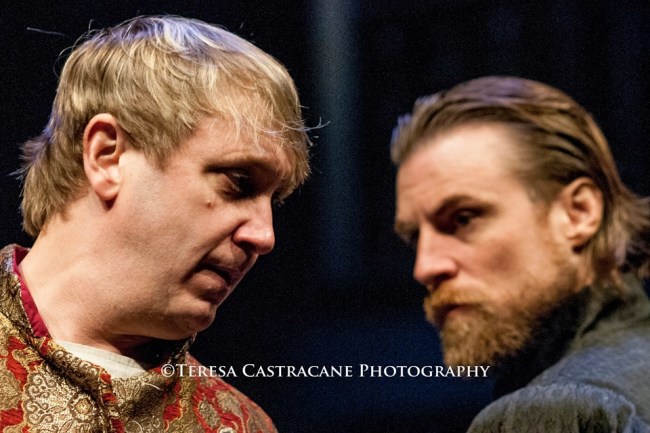
As a performer the other thing that this experience has given me— and it started with Edward but I had a lot of control with Edward, and now moving to Richard— working with Kevin and this cast has taught me how important collaboration is. I will take 100% of the credit for the work that I do and for the performance that I give but I can’t do that in a vacuum. It wouldn’t be what it is without the people that I’m working with. If Patrick Kilpatrick were not playing Bolingbroke I would not be doing Richard the way I’m doing Richard. There is so much that he gives and there is so much that comes from him. It’s interesting because our interactions on stage are very limited and very tense moments. His Bolingbroke doesn’t give my Richard much of anything at all. It’s not a deep giving emotional relationship between the two characters. But what Patrick as an actor is giving me in those moments is critical to what I’m doing.
I learned that in Edward too, to let things go and to let other people bring their creative ideas in and as a performer to not be threatened by that. I learned how to rest control and play together. Like I said, Richard’s been different because I don’t have the control but I brought that out of Edward and was able to let go and focus on my work and also collaborate. There have been actors in this show who have said “would you mind trying to do this so I can see if I can do that?” Absolutely. It’s been great. That’s the biggest lesson I’ve learned as a performer. It’s not all about me. I learned a lot about that in Richard III too with Catesby. Catesby is this tiny role but people still talk about it. It’s very “wow” for me to realize that I can take this tiny role and make something that people notice that is part of a bigger whole. I love being on stage. I love telling these stories.
Have you always been drawn to the Shakespearean and the classics?
Jonas: No. I’m a gigantic fan of Tennessee Williams and Sam Shepard. And I’ve only done one of Tennessee’s plays and I’ve never done any of Sam Shepard’s. And it was Suddenly Last Summer, so it was the crazy one, the one with the cannibals. I’m very excited to be doing the sketch thing in January, that’s very collaborative too. I would like for the next role that I accept to be more contemporary but I do love drama and I do love the classics.
With so many Shakespeare companies popping up all across the map, why should people choose Chesapeake Shakespeare Company and their production of Richard II as their fall entertainment choice?
Jonas: It’s a gorgeous space. In my opinion it’s a wonderful place to see theatre. To begin with it is a comfortable house; there are two bars one of which stays open for the entire show. There is a gorgeous ceiling. It’s a great venue. On top of that Richard II is a very accessible but unknown piece. It’s not that Shakespeare that people know. It’s an opportunity to see something that people probably haven’t seen before. I feel like it is a very human piece. Like I said with the quote I gave you earlier, if every audience member could walk away with just that line in their heads and really ponder it and think about what it means to sort of empty yourself to be content then maybe life would be a little simpler. There are lessons in there. It’s not just “oh, it’s Shakespeare it’s classical theatre.” Shakespeare has the resonance that he has today because of that.
I love the show. I think it’s a great show and I am very proud of what we have accomplished. There are some actors that I didn’t know before this that I find fascinating to watch and to play with. It’s been a truly amazing experience.
Richard II plays through November 9, 2014 at Chesapeake Shakespeare Company— 7 S. Calvert Street in Baltimore, MD. For tickets call the box office at 410-244-8570 or purchase them online.
Click here to read the TheatreBloom review of Richard II.

